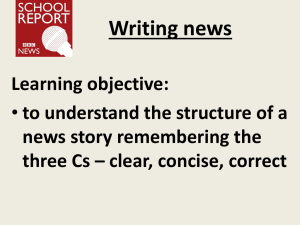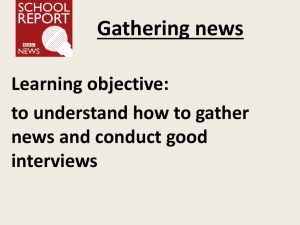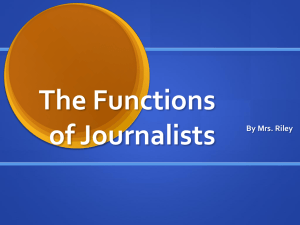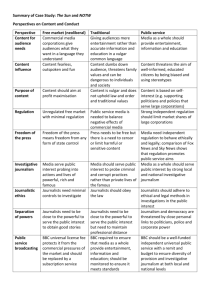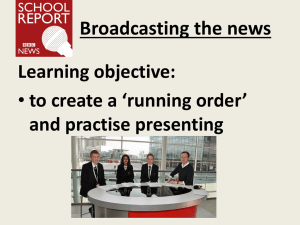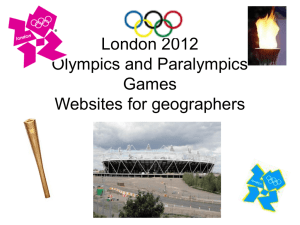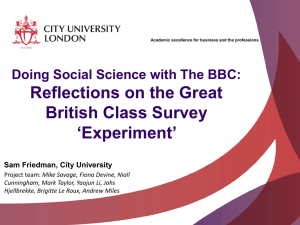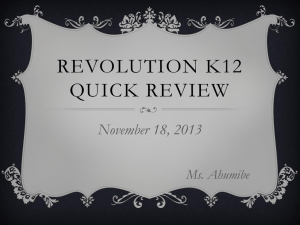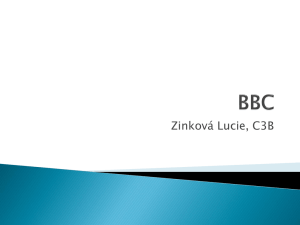What is news?
advertisement
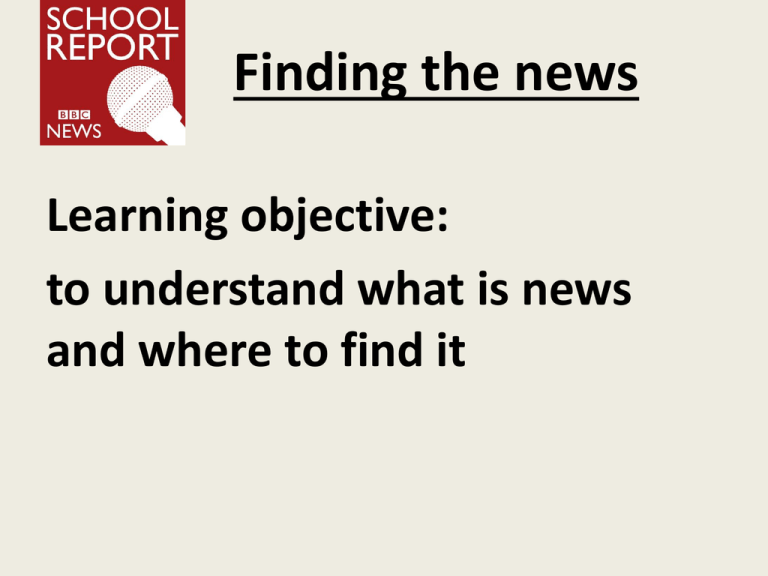
Finding the news Learning objective: to understand what is news and where to find it Starter: What is news? In groups/pairs, think about what news is. Watch: What is news? BBC video - what is news? Key points: What is news? News needs to be something new. It must mean something to your audience – something they need to know or want to know. On BBC News there is a mixture of different sorts of stories depending on the audience. Almost everything that interests you or your friends, could be a news story. A good journalist keeps their eyes and ears open everywhere they go. Activity: News judgement News judgement • Why did you choose the stories you did? • What do you think the key ingredients of a good story are? • What are the most important elements of a good story? Discuss - where might you find news stories? Watch BBC News - School Report: Finding news masterclass How does BBC Radio 5 live journalist Karlene Pinnock find stories and guests for her programmes every day ? Finding news: Key points Remember: • Don't assume everything you're told or read is true. • Use sources you trust and check at least two different sources. Why? If two people tell you the same story, it's more likely to be true. • Truth and accuracy are two of the BBC's news values, as a School Reporter it's your job to make sure everything you say is correct. News quiz 1. What do journalists do? a. They find and report newsworthy stories. b. They just watch the news. c. They promote politicians and businesses. News quiz 2. Which of these headlines is NOT news? a. US President to visit UK. b. Pupil drops pen during lesson. c. Usain Bolt breaks 100m record. News quiz 3. Contacts are... a. People journalists talk to when they are researching stories. b. Notebooks which contain a journalist's research. c. The big TV screens in the newsroom. News quiz 4. What are "wires"? a. A nickname for camera operators. b. Another name for headlines. c. Reports from journalists all over the world that news organisations pay to access. News quiz 5. The head teacher of a local primary school tells you that she's upset about a proposal to close her school. What headline would you choose for this story? a. Head teacher announces school closure b. Head teacher upset over school closure plan c. Head teacher attacks council over school closure News quiz 6. Which of these audiences is Newsround aimed at? a. 18 to 25-year-olds b. 13 to 17-year-olds c. 6 to 12-year-olds News quiz last question! 7. Which of these is NOT a news platform? a. TV b. Radio c. A desk Answers 1. What do journalists do? a. They find newsworthy stories, creates reports and share them with the public. 2. Which one is not a headline? b. Pupil drops pen during lesson 3. Contacts are …. a. People journalists talk to when they are researching stories Answers 4. What are "wires"? c. Reports from journalists all over the world that news organisations pay to access. 5. The head teacher of a local primary school tells you that she's upset about a proposal to close her school. What headline would you choose for this story? b. Head teacher upset over school closure plan Answers 6. Which of these audiences is Newsround aimed at? c. Newsround is aimed at 6 to 12-year-olds. Answers 7. Which of these is NOT a news platform? c. A desk is NOT a news platform The BBC uses lots of different platforms to broadcast news: TV, radio, websites, mobile phone apps, iPlayer, the Red Button service and social media sites.
